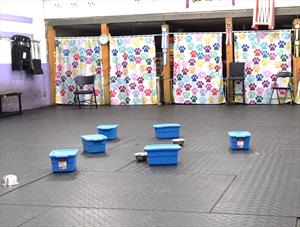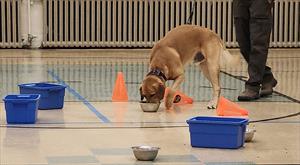Dogs and other species explore and learn a great deal about their world through scent. In fact, that is how they primarily explore the world when they are born. Humans may not understand the importance of giving dogs access to sniffing time, and as a result, sniffing and seeking out different odor sources is actively discouraged. To ensure that dogs are ready to receive information, humans tend to reinforce eye contact and attention rather than letting dogs sniff and explore.
Scent work is a great way for dogs, cats, and even horses to get a chance to use those natural senses. Sniffing has physical and emotional benefits for dogs. It can decrease heart rate, lower blood pressure, and improve a dog’s optimism. Dogs build confidence and independence when they are allowed to sniff. Scent work provides important observations about physical health and emotional stressors.
There has been a significant increase in the popularity of sport scent detection, where dogs and handlers participate in trials to locate unknown hidden scent targets. This activity is enjoyable for both dogs and handlers, as it allows dogs to engage in sniffing while giving handlers insight into their dog’s natural abilities. When organizing scent exercises, having clear objectives is essential. Sport scent detection is goal-oriented, while scent work for decompression and emotional well-being is more casual. Scent work can be as casual as taking a loose leash walk and letting your dog explore or as structured as competitive sport scent detection.
Setting up Scent Work for Decompression and Enrichment
Choice is important when setting up scent activities for decompression and enrichment. Use a variety of your dog’s favorite food rewards or toys to encourage your dog to hunt. When using food, have the rewards easily accessible and be liberal with the amount. Do not inadvertently create too much pressure for your dog by having them work too hard. Walls, corners, or many changes in footing can create conflict for your dog when they are learning the game. Do not micromanage. As dogs understand the game better, space out the food rewards until they are all in one location.
Observing the behavior when your dog is searching, as well as after they are done, determines if the game is helpful with decompression or if adjustments need to be made. If arousal increases (searching more frantically) or your dog becomes reluctant to search, add in a recovery search by liberally scattering treats in the area.
As your dog becomes more proficient in searching, their confidence increases despite changes in the environment, and their recovery time from distractors or triggers decreases. Your dog learns they have a choice in movement, and they can rely on their own senses.
Tips for Doing Scent Work
Ensure your dog has a choice at all times. They can choose what to eat and what not to eat. Do not point out every piece of food to them nor force or trick them into an area they missed. When setting up the course, be mindful that some dogs find certain scents aversive. If you direct your dog, they do not get the full benefits of scent work.
Make changes to the environment slowly. The addition of a single item can make or break a dog’s confidence; do not add too much change at once.
Keep it short. If your dog is struggling in the environment, remove your dog, change the environment, and then bring your dog back into the easier area.
Let your dog work. Most of the time, it should be about your dog figuring it out for themselves. Be quiet and let them work. If they find a particularly difficult item, providing a jackpot of treats and praise is acceptable.

Do not add fancy target scents for your dog to search. If you choose to use a specific non-food odor, ensure it is not offensive to your dog. The goal is decompression, not to create conflict.
Incorporating synthetic animal scents can also be a fun variation if your dog does not find them offensive.
Most of all, observe and adjust to your dog’s needs. The idea is to encourage active sniffing, which may involve liberal treats in a small area with no distractions. Incorporating some form of scent work into your dog’s daily routine has benefits that transfer to all aspects of your dog’s life.


